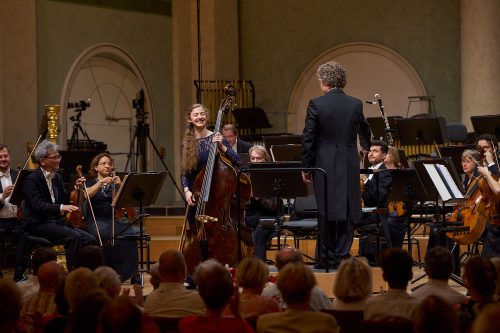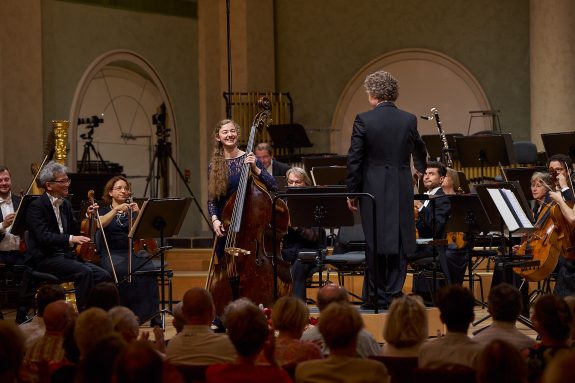 Germany Carl Flesch International Competition – Concertos and Chamber Music Rounds: 17 candidates (violin, viola, cello, double bass). Baden-Baden, Germany, 12, 13 and 14.7.2024. (LV)
Germany Carl Flesch International Competition – Concertos and Chamber Music Rounds: 17 candidates (violin, viola, cello, double bass). Baden-Baden, Germany, 12, 13 and 14.7.2024. (LV)

When Carl Flesch was born, Brahms was only forty and had not yet written his Violin Concerto; Fritz Kreisler had not written his cadenzas for the Beethoven concerto. In time, Flesch would become a great virtuoso who played with Arthur Nikisch and Wilhelm Furtwängler and, as a teacher, he would pass on the legacy of the great classical Romantic repertoire not as ashes from the past but as embers for the future. Flesch was also an outstanding chamber music player, and his piano trio with Artur Schnabel and Gregor Piatigorsky was one of the greatest of its time. In 1928, Flesch realized a dream of many years by buying a house in the German spa town of Baden-Baden where, during the summer months, he gave courses that attracted not only pupils but also a great number of listeners. A century later, his scales method for advanced violinists is still used widely.
The Carl Flesch Academy, founded in 1964 by Flesch’s student Henryk Szeryng, is held in an abbey on the outskirts of Baden-Baden around the corner from where Brahms and Clara Schumann once spent summers. During the second week in July, the 30 selected participants trained together to compete for top honors at the concerto finals. After their week of master classes, and orchestra and chamber music rehearsals, 17 participants played solo movements with the Philharmonie Baden-Baden, led by its chief conductor, Heiko Matthias Förster, who is overall director of the Academy. Many had never played with a professional orchestra before. The professors this year were violinists Kirill Troussov and Boris Kuschnir, violist Máté Szücs, cellist Kian Soltani and double bassist Janne Saksala.
It is the second year since Troussov was named artistic director and, in addition to the increased number and higher level of applicants, chamber music was upgraded into what was already a burgeoning, Marlboro-like environment. It gave the participants an opportunity to work off their excess energy and to give a brilliant concert on Saturday night at the Hotel Maison Messmer next door to Baden-Baden’s fabled casino. There was so much going on during the week that any focus on who was going win became somewhat deflected, and genuine friendships developed among the participants.
The two concerto concerts with orchestra took place in the horseshoe-shaped Kurhaus also adjacent to the casino, set in a long park that follows the curve of the city. It is a wonderful place to hear music – large and spacious, yet intimate at the same time. During the week of the Academy, there was a fabulous vintage car exhibition in the park, a fit setting for the musical stars.
Inside, as the concerts began and the aspiring young virtuosos came on the stage maneuvering through the orchestra with their instruments – which for the double basses always made quite a show – there was an excited rustle in the hall. Each soloist would acknowledge the welcoming applause of the audience, shake hands with the conductor and the concertmaster, take up a position on stage and, with one last nod to the conductor, wait for the baton to drop. After their performances, they all took one curtain call. The audiences were enthusiastic at both concerto concerts, and the chamber music concert was sold out.
From the moment Lauren Yoon soared angelically above the opening of the Korngold Violin Concerto, with her heavenly phrasing superbly timed, the top prize (The Carl Flesch Prize €3,000) was hers. I was once told that the Korngold is not really difficult if you don’t think it is. It never seemed to occur to Yoon, and her lead back to the big theme was something broad and beautiful that must have further clinched the decision.
There was something intensely personal in the way Eun Che Kim played the first movement of Dvořák’s Violin Concerto with which she won two of the top three prizes (The Werner Stiefel and Brahms Prizes €3,000). She had a serene integrity of line, never marred by a wrong note and unfazed by the composer’s awkward orchestral writing, which the Philharmonie and Förster tamed as best they could.
Violist Elena Küssner took home the top viola prize (The Mayor’s Prize for the City of Baden-Baden €500) with Paganini’s outrageously florid and sentimental Sonata Op.35: her pizzicatos were explosive, her virtuosity spellbinding, her playing of the Big Theme unforgettable. True, there were moments when the music seemed out of control.
The prize (The Henle Prize €500.00) for best cellist went to Nagyeom Jang for her superb performance of the first movement of Dvořák’s Cello Concerto on opening night. After an exceptionally vibrant orchestral introduction, Jang gave full measure to her phrases, and flashed a gorgeous open A in her big tune. She made Dvořák’s flying staccato arpeggios magical, for once, instead of boring, and she used a heart-breaking portamento all her own in the slow lead-up to the big glissando which she then proceeded to nail.

Ariane Thomann was one of many outstanding young participants in Janne Saksala’s class of double bass players and was a popular favorite when she was added at the last minute to Sunday afternoon for The Stennebrüggen Prize €1,000. In a movement from a concerto by Vanhal, she showed a superb sense of style, engaged deftly in dialogue with the orchestra, played with thrilling virtuosity and sang sweet love songs with youthful charm.
Yoeun Seol at 13 was the youngest participant and received The Troussov Young Talent Award €500. She brought Franz Waxman’s Carmen Fantasy alive with courage and sizzle. Troussov himself debuted in Moscow with the Russian National Orchestra at the age of eight.
The goals of the Carl Flesch Academy have always been to make the participants believe that they belong, and to inspire them to dream – and to achieve success in other prestigious competitions. And so, it was appropriate that, in Budapest the night before, the first prize for violinists aged 15–22 at the fifth Ilona Fehér International Violin Competition was awarded to Leonhard Baumgartner – who had won first prize at the Carl Flesch Academy the year before.
Laurence Vittes
12.7.2024 – Meisterkonzert 1.0: Various soloists in movements from concertos and other pieces by Dvořák, Mozart, Dittersdorf, Paganini, Korngold, Bruch, Vanhal and Tchaikovsky, Philharmonie Baden-Baden / Heiko Mathias Förster (conductor). Weinbrennersaal, Kurhaus.
13.7.2024 – Meisterkonzert 2.0: Various players in movements from chamber music by Mendelssohn, Bartók, Handel (arr. Halvorsen) and Schubert. Hotel Maison Messmer.
14.7.2024 – Meisterkonzert 3.0: Various soloists in movements from concertos and other pieces by Vanhal, Schumann, Walton, Sibelius, Waxman, Bottesini, Popper and Saint-Saëns, Philharmonie Baden-Baden / Heiko Mathias Förster (conductor). Weinbrennersaal, Kurhaus.
